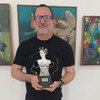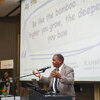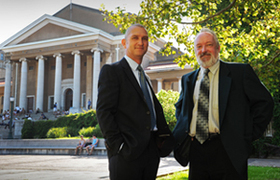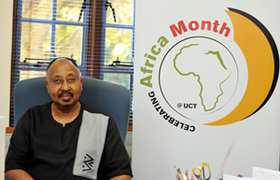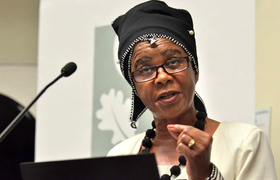Women science winners are role models
23 August 2010No fewer than three UCT researchers featured among the recently-announced winners of the South African Women in Science Awards (WISA), made annually by the Department of Science and Technology during Women's Month to recognise and create incentives for women scientists and researchers, and to create role models for young women and girls.
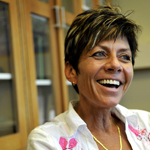 |
 |
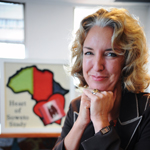 |
| Distinguished researchers: UCT's three winners of DST Women in Science Awards - Prof Jill Farrant, Dr Floretta Boonzaier and Prof Karen Sliwa-Hahnle. | ||
2009 runner-up Professor Jill Farrant was named the Distinguished Woman Scientist in the Life Sciences, while Professor Karen Sliwa-Hahnle was second runner-up in the same category. Dr Floretta Boonzaier was first runner-up in the Distinguished Young Woman Researcher in the Social Sciences or Humanities category. Read more...
Farrant, of the Department of Molecular and Cellular Biology and recent winner of the Harry Oppenheimer Fellowship Award, was singled out for her work on drought-tolerant plants, her research and publication track record, and her national and international standing. Also mentioned was the Equity Development Programme she runs to source funding for black and women students.
"Two awards in one year is a huge gift," she says. "This is by no means a singular effort. I celebrate by honouring the people - collaborators, students, and my wonderfully supportive partner and family who have helped make this possible."
Sliwa-Hahnle, professor of cardiovascular research at UCT and director of the Hatter Cardiovascular Research Institute, was honoured for her "substantial" contribution to the understanding of the causes and treatment of unexplained heart failure in pregnancy (a condition that affects one in 1 000 women in Africa following childbirth), and to the Heart of Soweto study that she initiated and ran at Wits University, a programme that's now being rolled out nationally.
While flattered by the award, Sliwa-Hahnle takes more pride in its 'role model' element. "Fewer than 10% of cardiologists in South Africa and Germany [her country of birth] are women," she says. "A lot needs to be done."
Boonzaier's WISA citation talks of her work in the Department of Psychology on the "construction of subjectivities" in relation to violence in intimate heterosexual relationships. That's a topic that Boonzaier has explored in her current projects, including a study conducted with Stellenbosch University that looks at intimate heterosexual relationships in a low income, semi-rural community in the Western Cape.
Boonzaier echoes Sliwa-Hahnle's sentiments on the importance of role models. "The academic environment has not always been welcoming for women, and black women in particular. Having role models and mentors can play an important role in facilitating the advancement of women's careers and making them feel like they actually 'belong' in academia."
 This work is licensed under a Creative Commons Attribution-NoDerivatives 4.0 International License.
This work is licensed under a Creative Commons Attribution-NoDerivatives 4.0 International License.
Please view the republishing articles page for more information.



